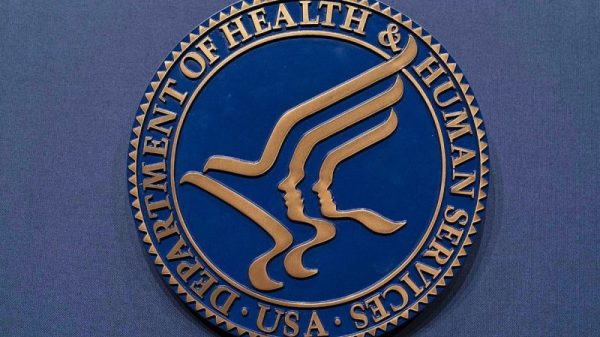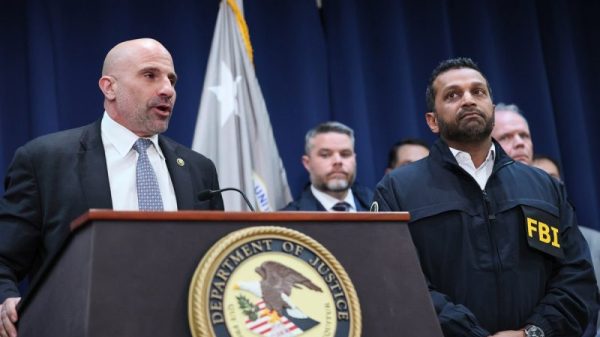President Biden’s dog Commander bit Secret Service agents about 24 times, more than previously disclosed, according to newly released Secret Service emails that for the first time reveal the agency’s deliberations about adjusting its operations to keep its agents safe from the dog.
Commander, the Biden family’s second German shepherd in the White House, bit people in at least two dozen episodes the agency recorded between October 2022 and July 2023, the newly released documents show. That raised enough concern among Secret Service leaders that they began tracking the incidents in a spreadsheet and warning agents to be careful.
After an 11th publicly disclosed biting incident occurred in the fall, Commander was sent away from the White House. He now lives with other family members.
A gift from Biden’s brother and sister-in-law, Commander was the second family canine to be sent away from the White House. The Bidens’ previous German shepherd, Major, was given to another home after several of his own biting incidents.
The Secret Service, whose personnel are equipped to train and handle the agency’s service dogs, struggled to keep its agents safe from Commander at the White House as well as at the Bidens’ homes in Delaware, Camp David and other locations where the biting episodes occurred, according to 269 pages of emails and internal records obtained via a public record request.
In October 2022, an unnamed Secret Service technician who was bitten by Commander but did not require medical attention wrote in an email that they were “worried about the family pet’s behavior escalating and that … something worse was going to happen to others.”
Those fears were seemingly widespread at the agency.
“The recent dog bites have challenged us to adjust our operational tactics when Commander is present,” a special agent in charge wrote in June. The supervisor recommended that Secret Service personnel create space between themselves and the dog, “be creative to ensure our own personal safety,” and be wary of where the dog is as they work.
The special agent in charge added, “The senior leaders of the detail and agency continue to address the issue at higher levels with staff and First Family — working to have a better solution soon.”
Sometimes the episodes occurred when the president and first lady Jill Biden were around, but agents also described other incidents in which staffers were unable to keep control of Commander. The biting episodes became infamous among the agents, prompting emails over the summer about tracking the number of biting cases and crafting a public response.
The first lady’s spokeswoman, Elizabeth Alexander, said this week that the family took several measures to keep Commander under control, but that those efforts did not work.
“The President and First Lady care deeply about the safety of those who work at the White House and those who protect them every day,” Alexander said in a statement. “Despite additional dog training, leashing, working with veterinarians, and consulting with animal behaviorists, the White House environment simply proved too much for Commander.”
On one occasion in June, Commander ran toward, knocked down and bit a special agent so deeply that the person required stitches, and tours of the East Wing of the White House were stopped for about 20 minutes because blood had spilled on the floor.
Agents also expressed concerns that Commander was sometimes unleashed in areas where they were patrolling. In May, one agent warned others that the dog was “either let out or gets out of the house on his own, off leash” while at the Camp David presidential retreat.
“I just had a run in with him … I’m pretty confident if I (hadn’t) gotten startled causing my cave man instincts to kick in with a bicep flex and a yell, he would have tagged me,” the agent wrote, recommending that agents alert each other if they see the dog off-leash.
The Bidens have been “heartbroken over this,” a person close to the first family said, speaking on the condition of anonymity to discuss private conversations. “They’ve apologized to those who have been bitten, taken flowers to some. They feel awful.”
Dog training experts who learned about the biting incidents but were not involved in Commander’s training raised concerns about the behavior. They said the busy, ever-changing environment Commander lived in was likely overwhelming the dog, and he should have been removed from the White House earlier to prevent further injury.
“How did it get to the point of that?” asked Ryan Bulson, a dog trainer and co-owner of Maryland-based Mason Dixon K9 Dog Training. Bulson said local laws mandate dog owners report bites to health departments and quarantine the dog, and he said he’s never heard of a dog being responsible for so many bites.
“I don’t know for sure but I would venture to say with the amount of bites that dog has, somewhere along the line, the process wasn’t followed,” Bulson said.
Suzanne Clothier, an animal trainer who breeds German shepherds, said she would have advised the Bidens to not bring a German shepherd into the White House but rather wait for their retirement.
“No one should come to work and have to be threatened by the boss’s dog,” Clothier said. “I feel bad for the dog put in positions way over his head. I feel awful for the Secret Service people. … And I feel bad for the Bidens.”
President Biden’s dog Commander bit Secret Service agents about 24 times, more than previously disclosed, according to newly released Secret Service emails that for the first time reveal the agency’s deliberations about adjusting its operations to keep its agents safe from the dog.
Commander, the Biden family’s second German shepherd in the White House, bit people in at least two dozen episodes the agency recorded between October 2022 and July 2023, the newly released documents show. That raised enough concern among Secret Service leaders that they began tracking the incidents in a spreadsheet and warning agents to be careful.
After an 11th publicly disclosed biting incident occurred in the fall, Commander was sent away from the White House. He now lives with other family members.
A gift from Biden’s brother and sister-in-law, Commander was the second family canine to be sent away from the White House. The Bidens’ previous German shepherd, Major, was given to another home after several of his own biting incidents.
The Secret Service, whose personnel are equipped to train and handle the agency’s service dogs, struggled to keep its agents safe from Commander at the White House as well as at the Bidens’ homes in Delaware, Camp David and other locations where the biting episodes occurred, according to 269 pages of emails and internal records obtained via a public record request.
In October 2022, an unnamed Secret Service technician who was bitten by Commander but did not require medical attention wrote in an email that they were “worried about the family pet’s behavior escalating and that … something worse was going to happen to others.”
Those fears were seemingly widespread at the agency.
“The recent dog bites have challenged us to adjust our operational tactics when Commander is present,” a special agent in charge wrote in June. The supervisor recommended that Secret Service personnel create space between themselves and the dog, “be creative to ensure our own personal safety,” and be wary of where the dog is as they work.
The special agent in charge added, “The senior leaders of the detail and agency continue to address the issue at higher levels with staff and First Family — working to have a better solution soon.”
Sometimes the episodes occurred when the president and first lady Jill Biden were around, but agents also described other incidents in which staffers were unable to keep control of Commander. The biting episodes became infamous among the agents, prompting emails over the summer about tracking the number of biting cases and crafting a public response.
The first lady’s spokeswoman, Elizabeth Alexander, said this week that the family took several measures to keep Commander under control, but that those efforts did not work.
“The President and First Lady care deeply about the safety of those who work at the White House and those who protect them every day,” Alexander said in a statement. “Despite additional dog training, leashing, working with veterinarians, and consulting with animal behaviorists, the White House environment simply proved too much for Commander.”
On one occasion in June, Commander ran toward, knocked down and bit a special agent so deeply that the person required stitches, and tours of the East Wing of the White House were stopped for about 20 minutes because blood had spilled on the floor.
Agents also expressed concerns that Commander was sometimes unleashed in areas where they were patrolling. In May, one agent warned others that the dog was “either let out or gets out of the house on his own, off leash” while at the Camp David presidential retreat.
“I just had a run in with him … I’m pretty confident if I (hadn’t) gotten startled causing my cave man instincts to kick in with a bicep flex and a yell, he would have tagged me,” the agent wrote, recommending that agents alert each other if they see the dog off-leash.
The Bidens have been “heartbroken over this,” a person close to the first family said, speaking on the condition of anonymity to discuss private conversations. “They’ve apologized to those who have been bitten, taken flowers to some. They feel awful.”
Dog training experts who learned about the biting incidents but were not involved in Commander’s training raised concerns about the behavior. They said the busy, ever-changing environment Commander lived in was likely overwhelming the dog, and he should have been removed from the White House earlier to prevent further injury.
“How did it get to the point of that?” asked Ryan Bulson, a dog trainer and co-owner of Maryland-based Mason Dixon K9 Dog Training. Bulson said local laws mandate dog owners report bites to health departments and quarantine the dog, and he said he’s never heard of a dog being responsible for so many bites.
“I don’t know for sure but I would venture to say with the amount of bites that dog has, somewhere along the line, the process wasn’t followed,” Bulson said.
Suzanne Clothier, an animal trainer who breeds German shepherds, said she would have advised the Bidens to not bring a German shepherd into the White House but rather wait for their retirement.
“No one should come to work and have to be threatened by the boss’s dog,” Clothier said. “I feel bad for the dog put in positions way over his head. I feel awful for the Secret Service people. … And I feel bad for the Bidens.”





















